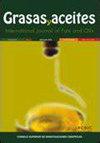Metabolic effects of chia oil in experimental models: a narrative review
IF 1
4区 农林科学
Q4 CHEMISTRY, APPLIED
引用次数: 0
Abstract
Chia seeds are a promising food for society and the scientific community because they contain polyunsaturated fatty acids, such as alpha-linolenic acid omega-3, antioxidants, and bioactive compounds. This study aimed to investigate the metabolic effects of chia oil in experimental models which have already been described in the literature. Twenty-two preclinical studies were selected, mostly with rats. The results showed that there is still no consensus on what oil dosage is ideal for generating health benefits, with the doses ranging from 0.1g/mL to 111.1g/mL and supplementation time of 1 to 33 weeks. The studies reported increased liver omega-3 contents, an improved lipid profile, increased HDL-c, and decreased total cholesterol levels. Improved glucose tolerance and insulin sensitivity, and improved antioxidant status. It is concluded that chia oil has shown beneficial metabolic effects in organisms in preclinical studies, acting on glycemic homeostasis, lipid profiles, and oxidative stress markers.奇异果油在实验模型中的代谢作用:综述
奇异籽含有多不饱和脂肪酸(如α-亚麻酸ω-3)、抗氧化剂和生物活性化合物,是一种对社会和科学界很有前景的食品。本研究旨在调查奇异籽油在实验模型中的代谢作用,文献中已有相关描述。研究选取了 22 项临床前研究,其中大部分以大鼠为对象。研究结果表明,对于何种剂量的奇异果油才能产生理想的健康益处,目前仍未达成共识,剂量从 0.1 克/毫升到 111.1 克/毫升不等,补充时间从 1 周到 33 周不等。研究报告称,肝脏中欧米加-3的含量增加,血脂状况得到改善,高密度脂蛋白胆固醇含量增加,总胆固醇水平下降。葡萄糖耐量和胰岛素敏感性得到改善,抗氧化状态得到改善。结论是,在临床前研究中,奇异果油对生物体的新陈代谢产生了有益的影响,对血糖平衡、血脂状况和氧化应激标志物都有作用。
本文章由计算机程序翻译,如有差异,请以英文原文为准。
求助全文
约1分钟内获得全文
求助全文
来源期刊

Grasas y Aceites
工程技术-食品科技
CiteScore
2.50
自引率
0.00%
发文量
50
审稿时长
3 months
期刊介绍:
Grasas y Aceites is a peer-reviewed journal devoted to the publication of original articles concerning the broad field of lipids, especially edible fats and oils from different origins, including non acyl lipids from microbial origin relevant to the food industry. It publishes full research articles, research notes, reviews as well as information on references, patents, and books.
Grasas y Aceites publishes original articles on basic or practical research, as well as review articles on lipid related topics in food science and technology, biology, (bio)chemistry, medical science, nutrition, (bio)technology, processing and engineering. Topics at the interface of basic research and applications are encouraged. Manuscripts related to by-products from the oil industry and the handling and treatment of the wastewaters are also welcomed.
Topics of special interest to Grasas y Aceites are:
-Lipid analysis, including sensory analysis
-Oleochemistry, including lipase modified lipids
-Biochemistry and molecular biology of lipids, including genetically modified oil crops and micro-organisms
-Lipids in health and disease, including functional foods and clinical studies
-Technical aspects of oil extraction and refining
-Processing and storage of oleaginous fruit, especially olive pickling
-Agricultural practices in oil crops, when affecting oil yield or quality
 求助内容:
求助内容: 应助结果提醒方式:
应助结果提醒方式:


